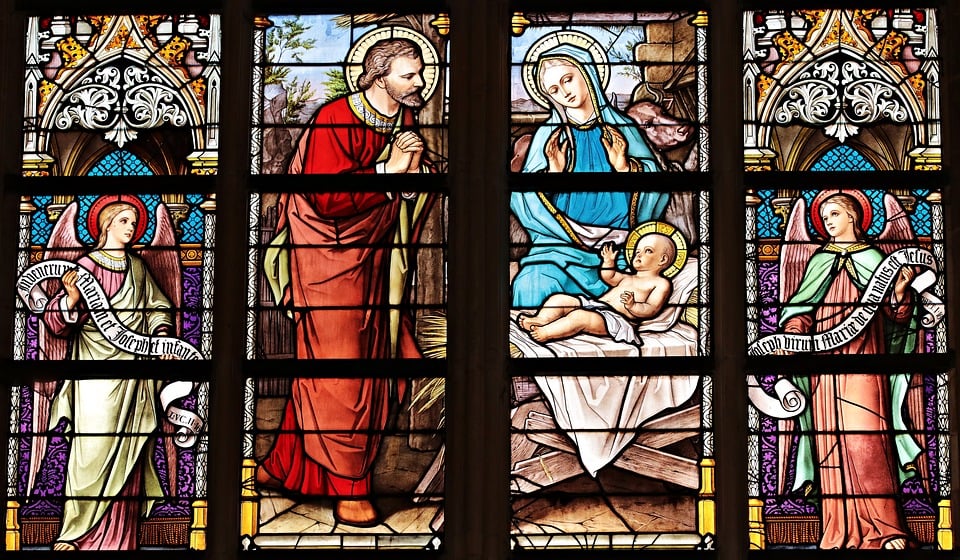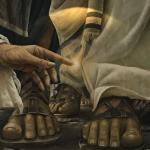What do two “prostitutes,” a “stripper,” an “adulteress” and a young unwed pregnant woman have to do with Jesus?

The inclusion of the five women in Matthew’s genealogy – especially four Gentile women – sets the stage for Matthew’s inclusive message, which culminates with the Great Commission in Matthew 28:19, in which the risen Jesus instructs the disciples to “make disciples of all nations.”
The Gospel of Matthew, the first book of the New Testament, effectively serves as a bridge between the Old and New Testaments. Matthew begins his Gospel with a genealogy, tracing the ancestry of Jesus to Abraham. From that beginning, Matthew immediately connects God’s covenant with Abraham and the prophesied heir to the throne of Israel to his story of Jesus.
A closer look at the genealogy and, specifically, its inclusion of four Gentile women and Mary, the mother of Jesus, might suggest a second, and equally important purpose in establishing the inclusivity of Jesus’ ministry even before it began – and the eventual welcome of Gentiles into the church.
THE GENEALOGY AND THE WOMEN
Matthew includes four foremothers who are Gentiles in his genealogy, and each could be said to have a rather questionable past. The inclusion of the four Gentile women – and the recollection of their stories for Matthew’s Jewish audience – may well have helped to prepare that audience for Mary’s unexpected story and the accompanying lesson that God could choose even the most unlikely candidates to serve God’s purpose in the world.
Tamar
The first woman mentioned in the genealogy is Tamar, to whom scriptural readers are introduced in Genesis 38. Tamar is a Canaanite woman who is married to Judah’s firstborn son, Er. Genesis 38 does not explain how Er came to be married to a Canaanite woman. We are told, however, that, because Er was “wicked in the sight of the Lord, [] the Lord put him to death.” According to Levirate law, Judah’s second-born son, Onan, was then to marry Tamar in order to produce offspring with her and carry out the family line. But Onan did not wish to produce children with Tamar because they would not be considered his own, and he “spilled his semen” before going to Tamar so that she would not become pregnant. The text explains that, for his disobedience, Onan, too, is struck dead. Judah has one remaining son, Shelah, but fears “that he too would die, like his brothers.” Judah sends Tamar back to her own family, claiming that he would send for her when Shelah grew older.
After some time has passed, a scorned Tamar realizes that Judah is not planning to send for her. Wearing a veil, Tamar waits for the now-widowed Judah as he is on his way to shear his sheep. He assumes her to be a prostitute, and arranges to pay for and receive her “services.” They agree upon a “price,” and she secures his ring as a promise for payment. Tamar becomes pregnant during the encounter, and when her pregnancy is later discovered, Judah orders her to be put to death, in accordance with Hebrew law respecting adultery. Tamar produces the ring that she received from Judah, and identifies him as the father. Judah acknowledges that he failed to send Shelah to Tamar, and accordingly, has failed to fulfill his responsibilities to her. Tamar delivers twin sons to carry on the bloodline of Judah’s family, but Judah “did not lie with her again.”
Rahab
Rahab, described in Joshua 2:1 as a prostitute, becomes an unlikely ally of Israel. She and her family live in Jericho, and she chooses to aid two spies sent by Joshua as they planned to enter and conquer Jericho. Rahab communicates how much the people of Jericho feared the people called Israel: The stories of the escape from Egypt and survival through the long journey had preceded them.
Rahab confesses her belief in the Israelites’ God. She asks the spies to save her and her family in exchange for her having helped them. The spies agree, and she and her family are spared in the fall of the city. In Joshua 6:25, we are told that Rahab and her family have “lived in Israel ever since.”
Ruth
In the short narrative book of Ruth, readers are introduced to a man named Elimelech who has traveled with his wife and their two sons from their home in Bethlehem to Moab, to escape famine in Bethlehem. Desperation is inferred: The Moabite people were scorned by Israel, perhaps in part because the people of Moab worshipped other gods. Elimelech’s family lives in Moab for many years. Eventually, Elimelech dies. The two sons marry Moabite women, but the sons also die, and Elimelech’s widow, Naomi, is left with her two daughters-in-law. Naomi decides to return to Bethlehem, and tells her daughters-in-law that they should return to their own families in Moab. One of the two daughters-in-law, Orpah, does as Naomi has asked, but the second daughter-in-law, Ruth, pledges to remain with Naomi, to travel to Bethlehem with her and even to take Naomi’s God as her own.
The two women travel to Bethlehem. Ruth fortuitously begins to glean in the fields of one of Elimelech’s kinsmen, Boaz, to get food for herself and Naomi. Boaz takes note of Ruth, and allows Ruth to continue to glean in his fields behind his servants. Ostensibly to secure Ruth’s future, but as much to secure her own, Naomi tells Ruth to go to the threshing room floor after Boaz has finished winnowing his barley and has laid down to sleep, suggesting that Ruth make what might have been perceived as an overt sexual advance toward Boaz. Ruth does as Naomi tells her, and Boaz responds by treating Ruth with respect. He tells Ruth that he will inquire of Elimelech’s closest kin whether he will redeem Elimelech’s property and take responsibility for Ruth; if that kinsman will not do so, Boaz assures Ruth that he will. Boaz does as he has promised, but the other kinsman does not choose to redeem Elimelech’s property. Boaz commits to redeem the property and take Ruth as his wife. Ruth conceives and gives birth to Boaz’s son, Obed, who is the grandfather of David.
In one of the most interesting of twists, it appears that Boaz is the son of Rahab and a man named Salmon, whose father, Nahshon, helped Moses with the census-taking of the people called Israel as they crossed from Egypt (Numbers 1:1-7). Boaz, no doubt, has heard many stories from his own family about the siege of Jericho and Rahab’s confession of faith – and his own family story may well have shaped him to be willing to choose a Moabite woman as his own wife.
The “wife of Uriah,” Bathsheba
While his soldiers are at war, David remains in Jerusalem and espies Bathsheba, wife of his soldier, Uriah, bathing. Bathsheba is described as being “very beautiful,” and David sends for her to come to him. According to the text of 2 Samuel 11, David has intercourse with her, and she becomes pregnant with David’s child. Unable to get Uriah to return home to have intercourse with Bathsheba to cover up his deed, David is forced to have Uriah killed. After Bathsheba’s period of mourning ends, David again sends for her, and marries her; later, she gives birth to David’s son. Although we are not told in the text whether Bathsheba went willingly to David when she was summoned or whether she had any effective ability to refuse his advances, we gather, because of his power as king, that Bathsheba had no alternative other than to do as David requested, and while her label in Matthew’s Gospel as “the wife of Uriah” might suggest that she is an adulteress, Bathsheba may actually have been a rape survivor.
Mary, Mother of Jesus
Like the stories of the four Gentile women, the story of Mary would also have raised questions in the ancient world. In the opening of the Gospel of Matthew, readers are told little about Mary. Betrothed to Joseph, Mary is found to be pregnant “before they lived together.” Under Jewish law, Joseph was entitled to divorce her; further, a finding of adultery could have led to her execution. As an unmarried pregnant woman, Mary would have brought shame and dishonor to both Joseph and her own family. Readers are told in the Gospel of Matthew that Joseph’s initial response is to “dismiss her quietly,” so as not to “expose her to public disgrace.” Joseph is visited by an angel in a dream and told that the child Mary has conceived is from the Holy Spirit. Joseph accepts the calling that God has made on his life and goes forward with the marriage, “but had no marital relations with [Mary] until she had borne a son; and he named him Jesus.”
HOW DO THE WOMEN OF MATTHEW’S GENEALOGY INFORM OUR UNDERSTANDING OF HIS THEOLOGY?
How might the message of Matthew 1:1-17 have been heard by Matthew’s audience?
The stories of the four Gentile women from the royal genealogy set listeners up for Matthew sets up for Matthew’s account of Mary, one more in a line of women whose reputation might have caused the people called Israel humiliation and shame. The foreign women with their checkered pasts – women whose ethnicity, whose reputation, might have caused humiliation and shame in generations that have come before, outsiders that we otherwise might not expect to see in the line of Israel’s monarchs, everything that ancient Jewish culture would have warned against – have shaped the lives of the Jewish men who came from them and the stories of generations of Jews.
Indeed, the presence of the outsiders in Joseph’s family story have helped shape him into the man that he is: a man already disposed to be compassionate, a man who hears the message of God to disregard the humiliation and the shame that would come from the revelation that the woman to whom he is engaged will bear a child who is not his own. Joseph meets Mary’s faithfulness with faithfulness of his own. He’s willing to step out and bring this story into the light, for all to see.
The inclusion of the five women Matthew chooses for his genealogy seems indicative of the lens through which Matthew views Jesus’ ministry. While Matthew begins his Gospel by establishing Jesus’ ties to Israel through Abraham, he also establishes that Jesus’ ministry will not be exclusive to Israel. The inclusive and universal nature of Matthew’s message builds throughout the Gospel to the Great Commission in Matthew 28:19, in which Jesus commands the disciples to “make disciples of all nations.” The women from the genealogy represent the “nations” – persons from different cultures, immigrants, victims of rape, persons who have been subject to domination and exploitation, the widowed, and the marginalized. The Gospel of Matthew and the inclusion in his genealogy of these women of “questionable” backgrounds remind us even today that all “nations” and all persons – no matter how we may have been (mis)characterized by others – are included within the ambit of God’s love.













